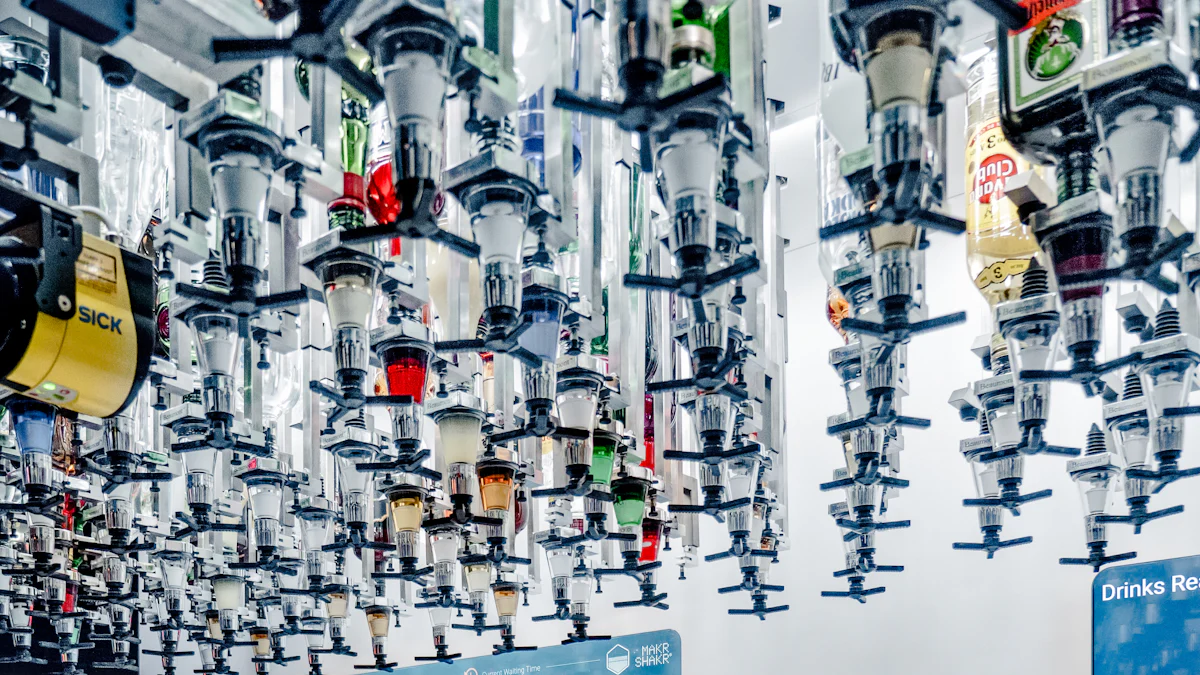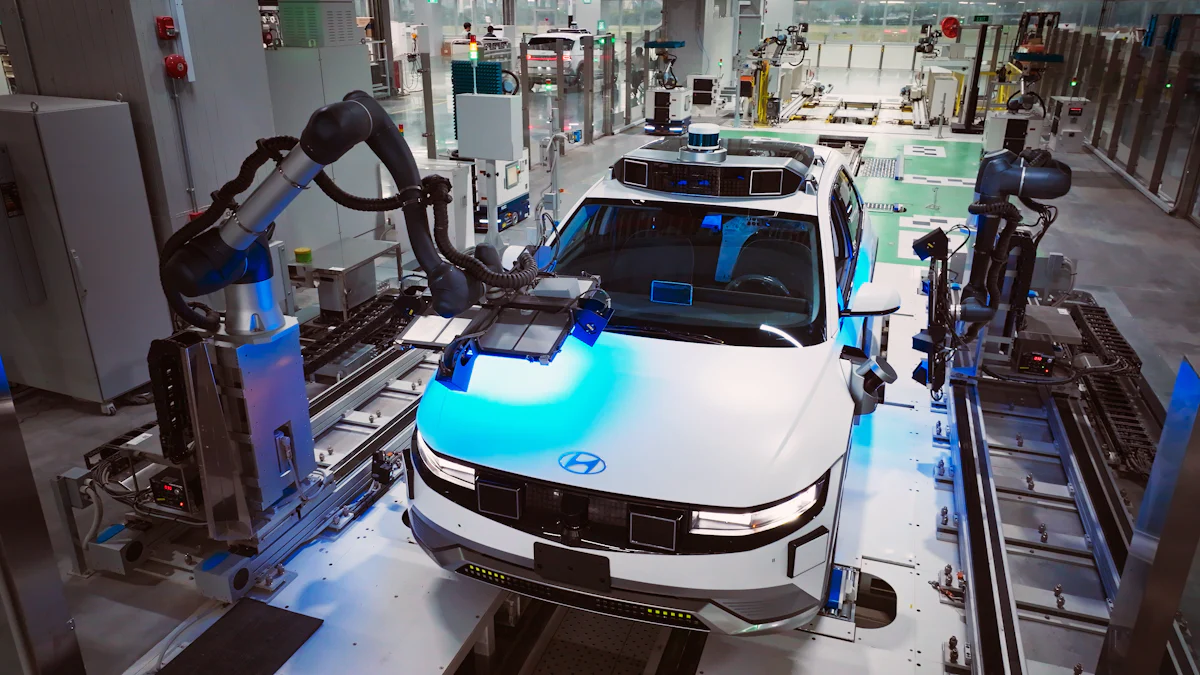Impact of technology manufacturing on the industry

Technology manufacturing has revolutionized the industry, driving significant advancements in efficiency and productivity. Understanding the impact of technology manufacturing is crucial for recognizing how these innovations shape modern industrial processes. Investments in new computing technologies have led to significant improvements in manufacturing, enhancing both safety and operational efficiency. The integration of automation and digital technologies can increase productivity by up to 25%, highlighting the transformative potential of these advancements. As North America continues to lead in smart manufacturing, the global industry must adapt to these changes to remain competitive.
Impact of technology manufacturing

Evolution of Technology in Manufacturing
Historical Perspective
The manufacturing industry has undergone significant transformations over the centuries. Early manufacturing relied heavily on manual labor and simple tools. The Industrial Revolution introduced mechanization, which drastically increased production capabilities. Steam engines and assembly lines revolutionized manufacturing processes, setting the stage for modern advancements.
Modern Advancements
Modern technology has further transformed manufacturing. The integration of automation and digital technologies has streamlined operations. Companies like Volvo Group and Toyota have implemented AI solutions to enhance production efficiency and reduce costs. Predictive maintenance and quality control systems ensure high reliability and safety standards. These advancements highlight the profound impact of technology manufacturing on the industry.
Benefits of Technological Advancements
Increased Efficiency
Technological advancements have significantly increased efficiency in manufacturing. AI and robotics have automated repetitive tasks, reducing human error and speeding up production. For instance, Caterpillar’s adoption of AI technologies has enhanced machinery quality and durability. Predictive maintenance strategies ensure uninterrupted operations, boosting productivity. Manufacturing Execution Systems (MES) oversee and manage various processes, ensuring smooth operations and efficient production.
Improved Quality
Quality control has seen remarkable improvements due to technological innovations. Big data and IoT technologies offer enhanced defect detection and predictive analytics. IoT enables remote monitoring and automated inspections, leading to better decision-making. Toyota’s integration of AI-driven quality control reduced defects by 30%, showcasing the potential of these technologies. Enhanced quality control measures have revolutionized the automotive tool set manufacturing industry.
Challenges and Concerns
Job Displacement
The automation of manual tasks has led to job displacement in the manufacturing industry. As production workers use more new technology, the need for manual labor decreases. This shift has raised concerns about employment opportunities. Gender disparity within the manufacturing industry has persisted globally for years, exacerbating the issue. The industry must address these challenges to ensure a balanced workforce.
Cybersecurity Risks
The increasing reliance on digital technologies has introduced cybersecurity risks. Manufacturing IT systems are vulnerable to cyber-attacks, which can disrupt operations and compromise sensitive data. Companies must invest in robust cybersecurity measures to protect their systems. Ensuring data security is crucial for maintaining trust and reliability in the industry.
Future Trends in Technology Manufacturing
Artificial Intelligence
Artificial Intelligence (AI) continues to revolutionize the manufacturing industry. AI solutions implemented by companies like Volvo Group have increased automation and precision. These advancements have improved production efficiency and reduced costs. Predictive maintenance and quality control systems ensure high reliability and safety standards. Enhanced supply chain management optimizes resource use and response times. Energy management initiatives lead to a reduction in environmental impact.
Caterpillar’s adoption of AI technologies has enhanced machinery quality and durability. Predictive maintenance strategies ensure uninterrupted operations and boost productivity. Enhancements in supply chain logistics reduce operating costs. Energy management initiatives significantly reduce energy consumption. AI-driven quality control reduces defects, showcasing the potential of these technologies.
Toyota’s integration of AI and robotics into manufacturing processes has improved production efficiency and product quality. Robotic automation and AI-driven quality control have reduced defects by 30%. AI-enabled supply chain optimization has resulted in a 20% reduction in inventory costs. Energy management efforts have contributed to a 15% decrease in energy consumption.
Manufacturing Execution Systems (MES) play a crucial role in smart manufacturing. MES oversee and manage various manufacturing processes, ensuring smooth operations, quality control, and efficient production. MES integrate data from different parts of the manufacturing process, allowing real-time monitoring, tracking, and optimization.
Sustainable Manufacturing
Sustainable manufacturing focuses on reducing environmental impact. Companies adopt energy management initiatives to lower energy consumption. Volvo Group’s energy management initiatives have led to a reduction in environmental impact. Caterpillar’s energy management initiatives have significantly reduced energy consumption. Toyota’s energy management efforts have contributed to a 15% decrease in energy consumption.
Manufacturers implement sustainable practices to minimize waste. Predictive analytics and machine learning help estimate demand, manage inventory effectively, and reduce waste. Big data and IoT technologies offer enhanced defect detection and predictive analytics. IoT enables remote monitoring and automated inspections, leading to better decision-making.
The global supply chain faces challenges such as localization and supply chain resilience. Governments worldwide emphasize the importance of localizing key supply chain elements to mitigate risks associated with global fluctuations. The U.S. focuses on reducing carbon emissions and enhancing supply chain security. Mexico and Vietnam benefit from nearshore production trends.
Sustainable manufacturing aligns with the trend of agile supply chains. The C2M2C (Customer-to-Manufacturer-to-Consumer) model provides a flexible, efficient, and demand-driven solution. This model covers raw material procurement, component manufacturing, and finished product assembly. Sustainable practices ensure a balanced approach to manufacturing, benefiting both the industry and the environment.
The impact of technology manufacturing has reshaped the industry. Automation and AI have increased efficiency and improved quality. Companies like Caterpillar and Volvo Group have integrated AI to enhance production and sustainability. Predictive maintenance and quality control systems ensure high standards and reduce costs.
Future trends indicate a continued focus on AI and sustainable practices. The industry must adapt to these advancements to remain competitive. Readers should reflect on how these technologies can influence their roles and consider embracing innovation.
See Also
Revealing How Technology Impacts Market Trends
Efficiently Resolving High-Tech Manufacturing's Supply Chain Challenges
Dispelling Myths About Automation in High-Tech Manufacturing
Automated Future: Warehouse Advantages in High-Tech Manufacturing
Collaborative Innovation: Improving Supplier Connections in High-Tech Manufacturing
